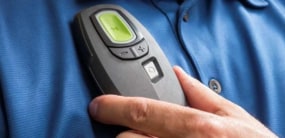Sleep Medicine
Tired of being tired?

Inspire Sleep
Inspire is a surgical alternative to CPAP that works inside your body. It’s a small implantable device placed during a same-day outpatient procedure. The device is turned on nightly with a small remote and stays on while you sleep.
Learn more
Getting a good night’s rest is important for your well-being. Not only does it affect your overall physical health, it’s good for your brain because when sleeping, your brain is preparing for the next day by forming new pathways to help you learn and remember information.
Too often, sleep problems are ignored or assumed to be psychological in origin. Better testing procedures have revealed new information on sleep-wake disturbances, resulting in greater understanding and more successful treatment.
Our sleep study center, accredited by the American Academy of Sleep Medicine, offers objective and systematic diagnosis and treatment of clinical sleep-wake disorders for persons of any age. Patients can be referred by a family physician or self-referral.
Why is sleep so important?
According to the National Institutes of Health, a good night's sleep improves learning and sleep deficiency alters activity in some parts of the brain, making it difficult for someone to:
- Make decisions
- Solve problems
- Control emotions and behavior
- Cope with change
In addition, sleep deficiency has been linked to depression, suicide, and risk-taking behavior.
Adults aren’t the only ones who need sufficient rest. Children and teens who have sleep issues may also have problems getting along with others or feel angry and impulsive, have mood swings, feel sad or depressed, or have a lack of motivation. They also may have problems paying attention, get lower grades and feel stressed.
How much sleep do you need?
You may think you can function on very little sleep; that 4-5 hours of sleep a night will be just fine. However, sleeping less than what is recommended adds up over time. Sneaking in a nap or two once in a while is ok, but naps don’t provide all of the benefits of a good night’s sleep.
The National Institutes of Health recommends the following amounts of sleep:
| Age |
Recommended Amount of Sleep |
| Newborns |
16–18 hours a day |
| Preschool-aged children |
11–12 hours a day |
| School-aged children |
At least 10 hours a day |
| Teens |
9–10 hours a day |
| Adults (including the elderly) |
7–8 hours a day |
Common sleep problems
Types of tests
Tests available at the sleep study center include, but are not limited to:
- Nocturnal polysomnography
- Multiple sleep latency test (MSLT/MWT)
- Nasal CPAP trial and re-evaluation
- Thorough medical evaluations and testing
Treatment and management
With accurate diagnosis, most sleep disorders can be effectively treated. Treatment plans vary by patient. Some plans may include medication while others may require changes in daily habits or working conditions. When sleep apnea is present, a technique of assisted respiration called nasal CPAP may be used to diminish serious health risks. Occasionally, surgical procedures can provide the most effective treatment for sleep-wake disorders.
Find a sleep medicine doctor in Sandusky
Our sleep medicine physicians are here to help you rest easier. If you have questions about our services, we will do our best to answer them. Find information on our sleep medicine doctors today. To schedule a sleep study or for additional information, call 419-557-7740 or 800-342-1177, ext. 7740.
Find a Sleep Doctor
Firelands Center for Sleep Disorders
Firelands Center for Sleep Disorders is now located at Firelands Main Campus at 1111 Hayes Ave.
Directions:
From the front desk, walk past the gift shop to the elevators on the right-hand side of the hall. Take the elevator to the third floor. Exit the elevator to the right and take a left at the hall. Take a few steps, and The Center for Sleep Disorders will be on your right.